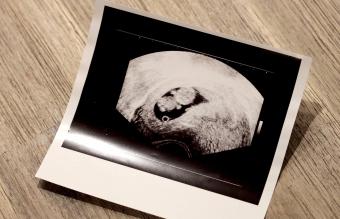
Most women feel great during the second trimester of pregnancy and enjoy being pregnant. At this point, they imagine having their babies and spend a great deal of time fantasizing about being parents.
Your Baby in the Second Trimester of Pregnancy
Your baby will be going through a huge amount of development during the second trimester of pregnancy, which is from weeks 13-26. WebMD showcases these month-by-month changes, which will show you that by the 14th week, your baby has coordinated movements of the arms and legs.
By week 20, you will probably feel your baby move. You will notice your baby has periods of movement and rest that actually correspond to your baby's sleep and awake cycles. This is a wonderful time to get to know your baby's personality. Is he awake during the morning or evening? Does he kick a lot when you exercise or have sex?
During the second trimester, your baby's hearing develops and you will notice him moving to loud sounds. Your baby is also developing head hair, eyelashes, and eyebrows. Lanugo (fine body hair) is growing and it will darken enough to be seen on an ultrasound.
By the time you're 26 weeks along, your baby is 12 inches long and weighs about a pound and a half.
Your Body in the Second Trimester
You will notice big changes to your body in the second trimester, outlined at the Mayo Clinic website. You will begin to show a beautiful belly bump and now people will notice that you're pregnant. Your breasts will become larger and you may enjoy showing a little bit of cleavage with your clothes. During the second trimester of pregnancy, you should be gaining about three to five pounds a month.
You may notice your libido increases during the second trimester. Don't worry about what your partner thinks about the changes in your body -- many partners enjoy this new body shape. You can't hurt your baby by having sex, though if you're at risk for preterm labor, you should talk to your care provider first.
Many women love this trimester since the early pregnancy symptoms have decreased, energy increases, and they are less moody. The other symptoms of dizziness, morning sickness, and nausea should have also abated. However, you may be experiencing symptoms such as itching, tingling, constipation, stretch marks, and shortness of breath. You can alleviate or reduce some of these symptoms by drinking lots of water, eating high fiber foods, and using moisturizers to help with the itching. If you're worried about developing stretch marks, you can use creams to help, though experts do not agree how effective these are.
Things to do in the Second Trimester
Continue to go to your appointments with your care provider. In this trimester you will hear your baby's heartbeat in your doctor's office and will probably get an ultrasound. You will also have to decide whether you want tests such as an alpha fetal protein (AFP) test, a triple screen, and amniocentesis. These tests carry risks you need to be aware of before you agree to them. These tests can help you learn about possible pregnancy complications and, depending on results, decide whether you wish to terminate a pregnancy.
In the second trimester of pregnancy, you will probably start wearing maternity clothes, depending on styles and how you carry your baby.
This is a good trimester to become aware of what preterm labor symptoms are. If you experience a leak of fluid from your vagina (check to make sure it's not urine), notice five or more contractions in one hour, perceive vaginal pressure, feel a low, dull back ache or notice blood-tinged mucus from your vagina, you should contact your care provider immediately.
By this point in your pregnancy, you may want to figure out what baby paraphernalia you need for your nursery. You may have a baby shower and receive many things beforehand. If you have time, you may want to register for baby items to prevent duplication. Things like a car seat, stroller, sling, crib/bassinet, and baby monitor are must haves. You may also want to start stocking up on diapers, baby clothes, and baby blankets.
Remember to keep eating nutritiously. Try to avoid junk foods, sweets, and fast foods. You should be eating lots of fruits and vegetables, about seven servings each day. You should still be taking a prenatal vitamin and drinking at least 8 glasses of fluid (mostly water) a day. Milk and juices do count as part of your fluid intake.
You should keep exercising as long as you feel comfortable, though high impact exercise is not recommended; if in doubt, check with your physician, according to Fit Pregnancy. Walking, cycling, and swimming are still safe. Pregnancy yoga is highly recommended and will help prepare you for labor and childbirth. You will still need to watch for dehydration and heat exhaustion.
In this trimester, you should sign up for your childbirth education class. Your local hospital may offer classes taught by a nurse or certified instructor. You may also consider looking for Bradley classes or hypnobirthing if you're aiming for a natural childbirth.
Middle of the Road
Because this is often the most enjoyable trimester, make the most of it. Buy attractive maternity clothes that complement your glowing complexion and enjoy a healthy lifestyle, both for yourself and your baby.







